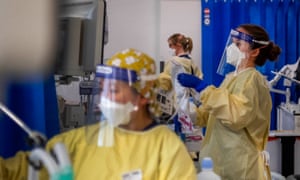The trauma of watching thousands of patients die during the Covid-19 pandemic will force many intensive care staff out of healthcare unless they get substantial mental health support, the charity that represents ICU workers has warned.
The Intensive Care Society said half of ICU staff needed psychological support to help them deal with their experiences and added that some had already left their professions.
“This pandemic is the greatest crisis we’ve seen in a century,” said Dr Stephen Webb, the ICS president. “There is a danger that we will lose further staff in the future. We know there’s a risk of people falling ill, wanting to leave – not just intensive care but healthcare completely.”
Research from King’s College London in January showed that 45% of ICU staff in England suffered severe anxiety, post-traumatic stress disorder or other mental health problems after the first wave, and the second wave had been even worse, Webb said.
“The second wave has hit people particularly badly in terms of their mental strength and mental wellbeing – knowing that they have to go through it all again, knowing the stress that it caused the first time,” he said. “And the second time, numbers have actually been far, far worse.”
Research by the ICS shows that, by January, there were an extra 2,251 intensive care beds in the UK, bringing the total to about 5,500.
Even though medical staff from elsewhere in the NHS have stepped in to help, ICU staff in the UK have shouldered the largest burden. Doctors who would spend their shift dealing with 12 patients now see up to 33. Nurses who would normally give one-to-one care have been dividing their attention between three patients or more. Psychologists who would help 10 patients now see between 69 and 134.
But the numbers pale next to the stories of heartbreak that intensive care staff tell themselves. Webb had his own breakdown last April, at the peak of the first wave.

“I remember coming home, talking to my family, going out into the garden – we had beautiful weather – and sitting down with a cup of tea, then just breaking down in tears,” he said. “We were just so stretched and I was just totally drained. It was just the sense of being overwhelmed.”
His story is mirrored by others across England, whose experiences are charted in an ITV documentary, 2020: The Story of Us, which will be broadcast on Tuesday evening at 9pm.
The documentary by Kevin Macdonald, the director who won an Oscar for One Day in September, follows the experiences of nurses and doctors, as well as Michael Rosen, the author and former children’s laureate who spent 48 days in intensive care at the Whittington hospital in north London.
Emma Jones, a dental nurse who was redeployed during the first wave, talks about the wife and two young sons of one patient who died. “They looked so scared, because they knew what was coming. And they looked lost and they looked frightened and I recognise that feeling. I recognise that face. I lost my mum 12 years ago.”
When the second wave hit, she asked her children what they thought before she was redeployed again. “My youngest daughter said to me she wasn’t sure if she wanted me to go back because she said most nights I’d come home crying,” she says. “I have a lot more soul searching to do this time round, whether it’s the right thing for them as well.”
Another nurse, Rowena Brown, who says in the film she finds it hard to ask for help with her mental health, discusses the pandemic with her mother. “The worst thing is that it’s changed me as a nurse. In April I was watching people telling me they can’t breathe.” As she starts to cry, she goes on: “And I’m sitting there saying, ‘I can’t help you.’ There was nothing I could do to help them heal.”
The ICS has run its own mental health support service for intensive care staff, run by its director for wellbeing, Dr Julie Highfield, and is beginning a new fundraising campaign called I Care for U.
But that was only part of the solution, Webb said. “We know that we were relatively unprepared in terms of staff and capacity, and that’s why the first wave hit us so badly. We need a huge investment in emergency preparedness. And that means making sure that we have a resilient, well-paid, well-trained, well-educated workforce.”
He said many ICS members were “really unhappy” with the “inadequate” proposed 1% pay increase, and the offer itself had affected the mental health of staff.
“There is a dissatisfaction about the pay offer that has been made and that is directly impacting on people who already have vulnerable, fragile mental health status, and undoubtedly could make things worse in the short term,” he said. “We will be pushing at the right time to make sure that the 1% figure is reviewed.”
The Department of Health and Social Care said a “24/7 service” had been made available to staff to support their mental health and wellbeing, as well as a national support service for critical care staff who are most at risk of experiencing trauma.
The NHS said: “It is absolutely right that hardworking staff who have cared for hundreds of thousands of patients are well supported and cared for, which is why there is help and advice available for all NHS staff working on the frontline, as well as those behind the scenes.”
• To donate to the Intensive Care Society campaign, visit www.ics.ac.uk. 2020: The Story of Us is on ITV at 9pm on Tuesday 16 March.
